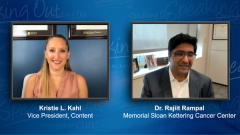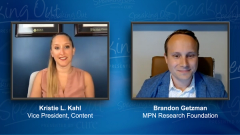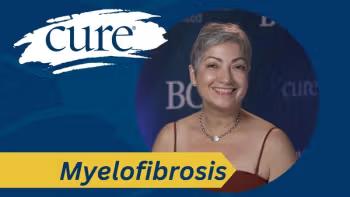
Highlighting the Need for Clinical Trial Education in MPNs
CURE spoke with Dr. Gabriela Hobbs, on behalf of the MPN Research Foundation, about the need for clinical trial education for patients with myeloproliferative neoplasms.
Kristie L. Kahl: What are the current challenges that we're seeing in MPN research?
Dr. Gabriela Hobbs: One of the challenges is really that a lot of the current clinical trials focus on adding new medications to old medications. And one of the things that I hope to see in the next round of medications or clinical trials that are tested, is really medications that target novel or new pathways that that that are used by themselves not like in combination so that we don't have to, you know, do two medicines at the same time, we can just use one. I think one of the one of the probably the biggest challenges, it's not specific to MPN is that enrolling in a clinical trial requires meeting very strict criteria. And although I understand this, because I am a clinical investigator myself, from a physician perspective, I also find it very difficult. And what I mean by that is that, you know, in order to learn from a clinical trial, the group of patients that is selected to participate in that clinical trial has to have certain similarities and has to have certain criteria that are met so that at the end of the day, the trial actually teaches us something. But on the other hand, sometimes because we're selecting, you know, patients, we end up excluding a lot of people that probably shouldn't have been excluded in the first place. And so that's one thing that I think is really difficult about clinical trials. The other thing that I think is really difficult about clinical trials, which is again, true of every disease, not just MPN is that in order to enroll in a clinical trial, patients need to be able to have access to hospitals that offer those clinical trials. And many times and this is something that I wish we would have done a better job with the advent of telemedicine really, is that is that the trials require patients to be seen in the hospital that offers at trial all the time. And so if you're a patient that lives very far away, you know, sometimes patients are able to come in and see a specialist once, but then it's difficult to come, you know, week after week. It would be wonderful if some of these trials would allow, you know, some virtual visits are some of the care to be done locally. But that doesn't always happen. And so thankfully for some MPN trials, we don't have to have as many visits But still, you it's difficult when patients are away. And so that's definitely a challenge. And then the other thing that really is something that I struggle with a lot is that opening clinical trials, especially for rare diseases, or something that requires an investment in the hospital and And sometimes that part is difficult to then perhaps many times hospitals or centers aren't able to open trials when they don't see a lot of the MPN patients. Because, you know, and I hate to think about it this way, but financially, it's something that the institution can support. And so, so those are challenges. And then lastly, and I think this is very relevant and very important. There are many groups of patients, patients that don't speak, they don't speak English, or they don't have access to, you know, specialized treatment centers, including minority patients, and patients that don't speak English, that oftentimes get excluded from clinical trials, because it just seems like there's so many obstacles to make it to the tertiary care center, and especially if the physicians don't speak your language or look like you.
Kristie L. Kahl: So with that, what are we doing to address those challenges?
Dr. Gabriela Hobbs: That's a great question. Honestly, the answer is not enough. And so, you know, I speak Spanish, and I try my best to translate and to and to help, you know, the patients that I can, but really, we need to have more efforts to reach out to our neighboring communities. Definitely, some of the things that we try to do is, like I was saying, you know, take advantage of telemedicine, and be more flexible with those visits. When, when possible. I personally tried to reach out to my referring network a lot to see if we can facilitate patients and enrolling in trials, and, and trying to bridge some of those some of those challenges, you know, seeing if some of the care can be done locally, and some of the care can be done here. But really, the problems are not easy to fix. And they really do require like a hospital level or even a country level efforts to really enroll all the patients that need access to these medications, not just the patients that can make it to the tertiary care hospitals.
Kristie L. Kahl: How can patients learn more to see if they might be eligible for a clinical trial?
Dr. Gabriela Hobbs: So there's two things I think one is, really it's talking to the physicians that are near where you live, and learning about not just what trials are available, but what trial is actually makes sense. And so sometimes I think patients may be like, oh, there's this trial, but it's across the country. And that sounds great. But that's really not good enough, I think that that's where it really helps to have a good care team, because they may be able to tell you, you know, actually, this clinical trial is fantastic. And it's worth you traveling to, you know, whatever place and uprooting your family for a bunch of months to do this. Because it's going to cure your, you know, something potentially like that. But oftentimes, clinical trials, especially early phase clinical trials, we don't really know if they're going to be effective or not, right, that's what we're studying, um, especially when they're in the early stages. And so doing all of these, you know, huge sacrifices to travel very far, or spend a lot of money to like, get your family elsewhere, etc. doesn't make any sense. And so even though it may seem appealing to participate in trial, it may just not be the right trial for you. And so really, I think making those decisions requires speaking to a to a person to a provider that is able to guide the patient and what makes sense for him or her. One, one way of just in general, learning about clinical trials, is through the NPN Research Foundation, or going to clinical trials.gov. And looking online, you know, what is what is available, what studies exist, but I think, really for clinical trials to really know, not only are you potentially eligible, but is this something that makes sense for you, I would really encourage patients that are watching this video to try to reach out to a provider that is able to guide them back.
Kristie L. Kahl: So are there any misconceptions that we can try to address misconceptions about clinical trials?
Dr. Gabriela Hobbs: Yeah, sure. These are, these are questions that I think we get very often. So the first thing is, you know, a clinical trial isn't the right treatment option for everybody. So if you're not interested in participating in clinical trial, because you feel like it's not the right thing for you, then nobody should force you to participate in clinical trial. It has to be something that you as a patient are interested in doing and understand why you're doing it. Because ultimately, as the patient, you are the one that is going to take that medication, experience any potential side effects and spend the time to come to clinics. One of the things that I explained to patients is it participating in a clinical trial takes time, and it potentially takes more time than if you were just a regular patient. On a clinical trial, because sometimes there are more visits that are associated with the clinical trials. I think the other thing that though On the flip side, of course, the other thing that's important to know about clinical trials is that we as investigators, and then as physicians that are offering these trials are under and in a good way, under a lot of regulation, we have to follow a lot of regulations and processes in order to get clinical trials open. And, and it's important to really appreciate that, like, sometimes it can really take several months to even a year to open a clinical trial, because it goes through so many steps to make sure, first and foremost that this trial is safe, and is ethical. And that's, that's huge. That's really, really important. I mean, the most important thing about doing clinical research is to make sure that you're putting the patient safety first. Because although, you know, we all want to offer patients medications that are going to, you know, change their disease, or cure them or make them better, etc. The first thing that we really want to make sure that we don't do is cause harm. And so there's a, you know, pretty arduous strict process in order to make sure that these trials are written in a safe way. And then that they're followed in a very, very strict way. So imagine a clinical trial, as a very, very, very detailed recipe, that's a patient shows up on day one, if they don't meet these parameters, then they can't get the medication, patients are followed again on day, whatever. And if they've had any side effects, or any of these issues, you stop the medicine or you lower the dose, or you etc. And so there's lots of events for the clinical trials, again, to really make sure that safety is the number one priority in treating patients. And so, I think that, you know, when patients say, you know, I don't want to be a guinea pig, etc, I get that, you know, obviously, nobody wants, wants somebody to try a medication who them without any reason or putting them at risk. But I think that you can be reassured if you're considering a clinical trial that we really respect I mean, truly respect and are thankful to our patients for agreeing to participating in trials. And because of that respect and appreciation that we have of our patients, we spend a ton of time really making sure that these trials are done in the safest, safest way possible. And you know, depending on where the clinical trial is in or where the medication is, in its process through the different stages, there are many more safety regulations that have to happen for each of these studies. So for example, if it's a medication that's being tested for the very, very, very first time and people we'll enroll just a few patients and then stop basically and say, Okay, everybody doing okay, are their numbers looking, okay, or their liver and kidney and heart and all these functions looking okay. And if everything looks okay, then we continue. But really, you know, we take it very seriously, right, we understand that we can't harm our patients when we're trying to medications. The other thing is the question about placebo. So when medications are being studied, especially earlier on, like the first inhuman kind of thing, usually patients are getting the medication, the study medication, and there's no placebo involved. If there is a placebo involved in the study, it has to be ethical. And I'll tell you about that in a second. But if there's a placebo involved in the study, you will know that that's a possibility. So there's no such thing as like you enrolled in a clinical trial. And you don't know if you're going to get placebo or not, like part of the process of consenting a patient of letting a patient know that there's this trial, and that they have the option of enrolling etc, is to explain that to them. In this trial, you will get this study medication, or in this trial, you may get placebo. And so, so that's an important thing to know, most studies don't offer placebo as an option.
The studies that do over placebo as an option, do that in several different ways. But I'll give an example. So let's say that we have a patient that's on jak inhibitor, and that jak inhibitor doesn't do its job, right. But the patient still has a big spleen or still has symptoms. There's a medicine, let's call it medicine a that's being studied to see if they can make that response better. So lots of the clinical trials that are happening right now are like that. And let's say that it looks in the early clinical trials that that medication had a really, really good response. And then the people that make this study, I mean this this drug went to get an FDA approved, and that situation would they would do is do a randomized placebo controlled study. And what that means is that a group of patients get the jak inhibitor by itself with the medication a and then another group of patients get the jak inhibitor with the placebo. And it's randomized meaning nobody can pick and you don't know and your doctor doesn't know which one of those two Did you get and the reason why that's allowed and why that's ethical, is because as of right this moment, the only medications that are approved to treat my myelofibrosis, for example, are jak inhibitors. And that the therefore, patients that are enrolling in that study that don't get the study medication, it's not like they're being deprived of something that we already know is better. That's why the study is being done. So if you're going to get a placebo, it's usually in combination with a medicine that you would be getting anyway. And I think that that's really important to know, it's not ethical, if there's a medicine that you could receive, it's not ethical or appropriate to say, there's this medicine that we know is good. And then there's placebo, we're gonna, you know, choose randomly choose, like, who gets a medicine and who gets placebo, that wouldn't be acceptable. And so I think it's just important. Like we were, you know, it's just important to be able to ask those questions of your care team to make sure that if you want to participate in a trial, you understand what you're signing up for. And remember, you know, if you're interested in participating in a study, that's great, you can always enroll in this study. And if it doesn't work out, you're not committed to the study, that when you sign a form, that's like a consent form that says, I, you know, I've received this information that what you're signing is just saying, I've been educated, I've been told about the study, and I agree to participate. But after that, you can withdraw from the study whenever the study doesn't feel right for you anymore. So don't feel like you have committed for like, a year or something like that.







